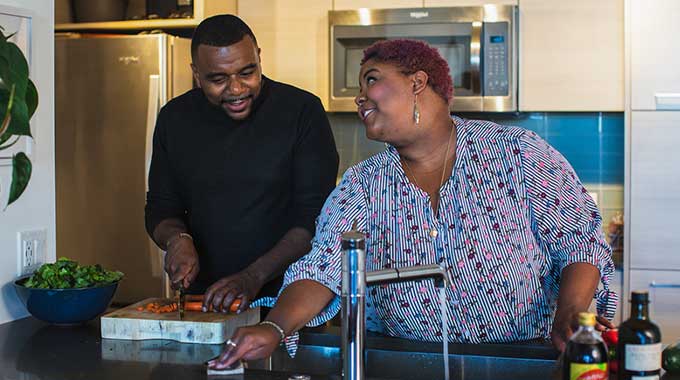Being a person close to someone who lives with depression means that you can be a big source of support, comfort, and love for them. It can also come with an enormous sense of pressure.
If you are having a tough time dealing with a partner’s mental health condition or are curious about how to help a depressed spouse, this blog may help you understand ways in which you can make a difference.
What Is Depression?
Depression is a serious mood disorder. It is sometimes also called a major depressive disorder or clinical depression, which involves symptoms that affect how a person feels, thinks, and can handle daily activities.
A persistent sad or empty feeling, hopelessness, and many more symptoms of this disorder can make it challenging for a depressed spouse to eat, sleep, and work.
Signs and Symptoms That Your Spouse Is Depressed
A change in behavior or daily habits is the earliest warning sign of a depressed spouse. They may eat or drink differently, be drunker or isolate themselves. Their interests in hobbies may change from doing activities with you or others to solo pursuits, or you may see signs of anger and irritability.
Other symptoms of depression include:
- Being critical, mean, or angry
- Withdrawing from friends and family
- They may abuse alcohol or drugs
- Abrupt behavior, such as suddenly wanting a divorce, or buying an expensive car
- Feeling hopeless or pessimistic, guilty or worthless
- Persistently being sad or anxious
- Feeling frustrated or restless
- Having difficulty in concentration, memory, or making decisions
- Appetite changes – either eating a lot or too little
- Physical pains such as headaches, cramps, or digestive problems without a cause, and these pains do not go away with treatment
- Oversleeping or not being able to wake up early, difficulty falling asleep
- Thoughts or attempts of suicide
What It Means to Have a Depressed Partner
Living with a depressed spouse can be very tough. It can feel isolating, or as if a person is the only one dealing with this challenge.
The truth is that many people are dealing with a depressed spouse. Around 280 million people worldwide suffer from depression and it does not discriminate; it can affect anyone regardless of age, gender, or mental health background.
Many people are unwilling to take medication or receive treatment for depression, making it even harder for their partners. Luckily, there are a few things that someone can do to have a healthy relationship with a depressed partner.
What Can I Do to Help?

While figuring out how to help a depressed spouse may seem like walking on eggshells, some basic concepts can help. A person may feel that if they push too much, the spouse may resist and withdraw even further, while not pushing enough may not encourage them to change or grow. That is why learning to help a depressed spouse normally requires putting in more work than usual.
Luckily, depression is treatable, and whether a spouse is willing to attend therapy or not, there are a few ways in which a person can respond healthily to anger or denial. Very often loved ones caring for a depressed husband or wife may develop depression themselves, so taking care of yourself is vital.
Suggest Treatment
Untreated depression has serious and sometimes fatal consequences. Not only does it stop people from working, eating, or sleeping, but it can also put them at high risk for suicide. According to the National Institute of Mental Health, only 66% of adults with a major depressive episode in the United States received treatment in 2020.
If you are worried that your spouse is suffering from depression, encouraging them to speak to a medical health professional is the first step. Help by locating treatment resources and suggesting these to your partner. Getting advice, diagnosis, or treatment is crucial in helping your spouse.
What if your partner does not want therapy? When there is a resistant spouse, a person could contact the doctor and explain that their partner has depression, describing the symptoms. Make an appointment with a family doctor, or with mental health professionals like a psychologist, psychiatrist, or counselor to begin therapy, and go with your partner.
Sometimes asking a person to do it just for their spouse or so that their spouse can feel better, convinces them to seek help, while other people like friends and family can help to get a person into treatment, too.
Get Support
By locating resources and going on a support search, a person will be helping themselves and their depressed spouse.
Very often a person’s needs come second when they have a depressed spouse, and finding a support network can be crucial in helping them stay healthy. That may include a community of support outside professional help. Talk to friends you can trust and reach out to the family.
A person may feel disappointment or anger when their partner has depression. Counselors, therapists, and support groups are not just there for those suffering from depression, but often for those with a relationship with them too. Seeking help for yourself can help you vent your feelings and frustrations, and support you in becoming more aware of your own emotional needs.
Individual therapy is also a practical means of support, as it provides a safe and private environment for someone to express how they feel about their marriage while finding ways to cope.
Separate Facts From Fiction
Your depressed spousemay withdraw from you or have angry outbursts, which may hurt you and cause you to react with similar behaviors. It is important to distinguish the many myths about depression from the facts, as this can help you understand your spouse’s situation, and help you to react healthily and encouragingly.
For example, know that depression is not the result of weakness or laziness. It can exist without a reason and does not always have to do with underlying causes. The pain that a person suffering from depression experiences may not be just in their head, so their outbursts are usually not personally directed at someone else.
Challenge any preconceived thoughts or ideas that you may have by educating yourself. Search for medical advice, diagnosis, or treatment and learn everything you can about the causes and symptoms of depression.
Take Care of Yourself and Your Mental Health
As with self-education, self-care is crucial to fostering healthy relationships with partners who suffer from depression. It is natural to feel stressed or concerned about your partner if they are dealing with a mental health condition. However, self-care is vital for both people.
Often a partner carries the weight of their depressed spouse’s difficulties. A person may have to take up additional responsibility at home, or they may be having a hard time finding the motivation to do things. Prioritizing self-care by setting small goals can help a lot. For example, ensuring that you take up your favorite hobby on a specific day, or making sure that you get to bed by a certain time, can help.
A spouse’s acting out can feel like a personal attack, and often partners of those suffering from depression view it as a reflection of their worth as a partner. Anger or lack of interest is usually not personal and has nothing to do with whether a depressed spouse still cares for or about their partner. Instead, these are signs and symptoms of an illness that requires help.
To help a person discard blame for their spouse’s depression, professional help may be needed. Usually, when one member of the family suffers from depression, other family members are more likely to face mental health challenges. That is why taking care of yourself is essential when living with a depressed spouse, and seeking a mental health professional may be the key to self-care.
Be There for Your Partner
Communication, understanding, and empathy are some of the keys to any successful relationship. These elements are especially important when in relationships with people with depression.
Often, those suffering from mental health issues do not necessarily want to be fixed, but instead may just want to be heard. Those suffering from depression often feel isolated, in pain, and hopeless. Listening and sympathizing is one of the best ways of being there for your partner.
It is important to use language that validates your partner’s feelings, instead of dismissing them. A partner will feel that their feelings are understood and they will feel supported, which can help them move out of a depressive state.
A depressed spouse most likely has low self-esteem and may have feelings of worthlessness. That is why positive reinforcement is a vital tool for helping. Getting out of bed and into the shower may not seem like a big accomplishment for an emotionally healthy person, but it can be very difficult for depressed men or women. Instead of being disappointed or punishing your depressed husband or wife for not accomplishing more, show them how proud you are for every small accomplishment.
Treatment is probably the most important factor in recovery from depression. Reassuring a partner that asking for help is not something to be ashamed of, or a sign of weakness, helping them with taking their medication or remembering appointments is another way of being there for them.
Build Healthy Habits
Incorporating healthy habits and positive rituals into a daily routine can help both you and your partner. It can help to encourage emotional and physical well-being and create stability.
Healthy habits can include getting enough sleep, exercising regularly, and eating healthily. It can also come in the form of practicing relaxing strategies like taking walks in nature, doing yoga, or practicing meditation.
Isolation is a big contributing factor to suicidal thoughts and is very common among those suffering from depression. So another healthy habit includes staying socially connected. Make efforts to ensure that your partner gets out of the house and has contact with loved ones.
Treatment Options

Treatment is key to recovery from depression. At GIA Miami, we understand that overcoming depression is difficult for both the person suffering and their loved ones.
That is why our exceptional and caring staff can help by providing individual therapy, as well as couples therapy. Innovative, evidence-based treatments at ourworld-class facilities can help your spouse with depression today.








